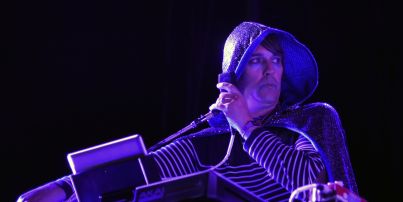It's not uncommon for members of a band to switch around the instruments they play every once in a while, but what is uncommon is for someone to permanently take up a different instrument than the one they originally played. Here are eight musicians who changed the instrument they played for their band.
1. Steve Drozd - The Flaming Lips
As I've written about before, Steve Drozd is probably the best thing to ever happen to the Flaming Lips. He joined the band as a drummer in 1991, but when guitarist Ronald Jones left in 1996, Drozd became the band's chief sonic architect, playing not only drums, but also keyboards and guitars on record. Since then, he's played guitar and keyboards in concert, but not drums.
2. Guy Picciotto - Fugazi
Guy Picciotto originally wanted to play guitar for Fugazi, but when he couldn't find a way to integrate himself into the band's original power trio formation, he became a vocalist and songwriter, singing both lead and backing vocals. However, by the release of Fugazi's second EP Margin Walker, Picciotto became the band's second guitarist.
3. Roger Daltrey - The Who
Though Pete Townshend is often thought of as the leader of the Who, lead vocalist Roger Daltrey was considered to be the leader in the band's earliest days, back when they called themselves "The Detours." In the Detours, Daltrey originally played guitar along with Townshend, but when vocalist Colin Dawson quit the band, Daltrey became the lead vocalist. Daltrey would occasionally return to guitar for the Who, most famously in the single "Eminence Front."
4. Paul McCartney - The Beatles
The Beatles may be known as "The Fab Four," but in its earliest days, the band was actually a five-piece. John, George, and Paul were all in the band, but Paul was playing guitar at this time, leaving the bass duties to Stuart Sutcliffe. When Sutcliffe left the band in July 1961, McCartney reluctantly switched over to bass, though he would play guitar often in the Beatles' studio years, such as the lead guitar on "Taxman" (as well as the killer bass line).
5. Joey Ramone - The Ramones
In true punk fashion, each of the Ramones' respective instruments weren't chosen by what they could play, but rather what they couldn't play. Dee Dee Ramone was going to be the band's original vocalist, but when he realized he couldn't sing and play bass at the same time, drummer Joey Ramone became the vocalist. However, when Joey too realized that he couldn't sing and play his instrument simultaneously, manager Tommy Erdelyi (Tommy Ramone) became the drummer, bringing Joey Ramone up front.
6. Ron Asheton - The Stooges
After the Stooges' first two albums failed to sell, the band broke up, and Iggy Pop moved to London to work on a solo album with David Bowie and guitarist James Williamson. However, when Pop recruited his old Stooges bandmates Ron and Scott Asheton to serve as the band's rhythm section, his solo album became the third Stooges album Raw Power, though Ron Asheton would be playing bass instead of guitar.
7. Dez Cadena - Black Flag
Before releasing its debut album Damaged in 1981, Black Flag went through four vocalists: Keith Morris, Ron Reyes, Dez Cadena, and finally, Henry Rollins. Cadena replaced Reyes in 1980, but eventually switched over to rhythm guitar in 1981, leaving Henry Rollins to become the face of Black Flag for the remainder of the band's career.
8. Keith Strickland - The B-52's
The B-52's had an unusual line-up for a rock band, featuring three lead vocalists and no bassist. The band's original guitarist was Ricky Wilson, brother of singer Cindy Wilson, who played on the band's first four albums. However, when Wilson tragically passed away in 1985 of an AIDS-related illness, the B-52's nearly split, but eventually reformed in 1988 to record the album Cosmic Thing, with drummer Keith Strickland taking up Wilson's place on guitar.
© 2025 MusicTimes.com All rights reserved. Do not reproduce without permission.






